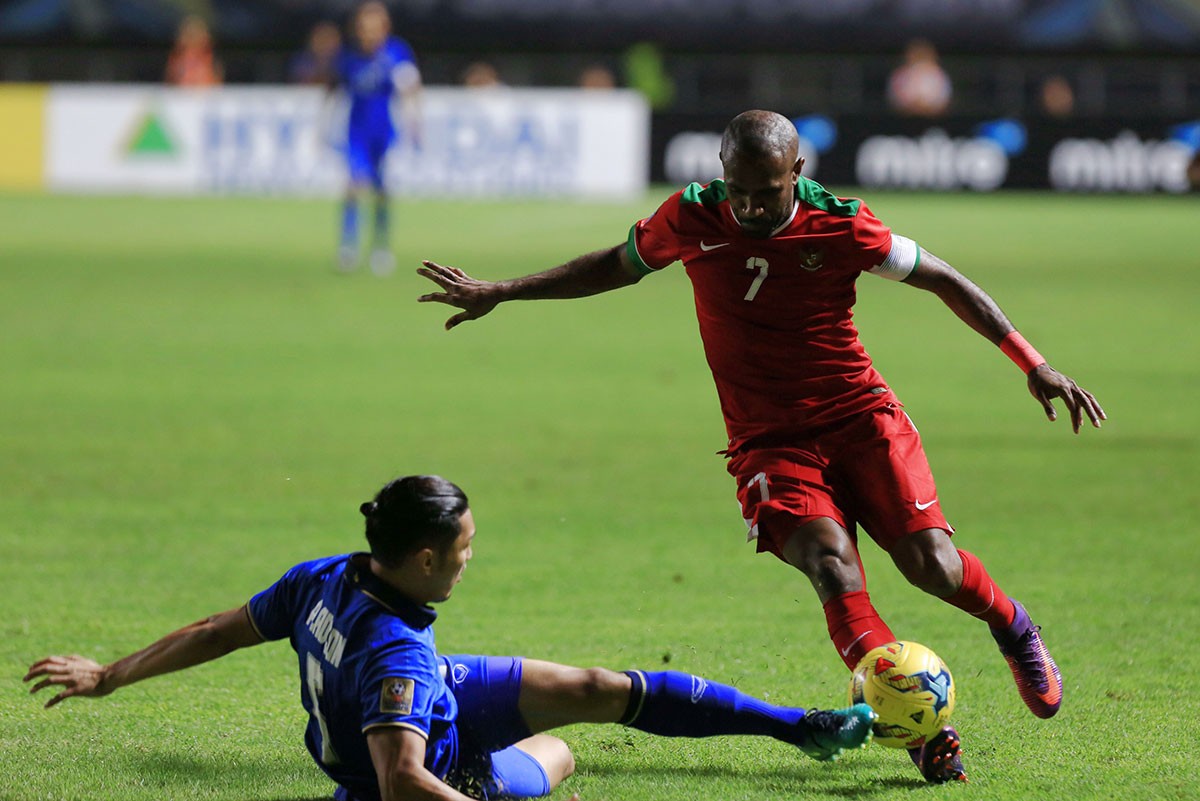Popular Reads
Top Results
Can't find what you're looking for?
View all search resultsPopular Reads
Top Results
Can't find what you're looking for?
View all search resultsElites must learn from soccer fans about racism
Why are Indonesian soccer supporters not known for racism? The answer is simply because they respect Papuan players big time. Soccer-wise, Indonesia has always depended on extraordinary talents from Papua. The fans never dare to despise or belittle their abilities and roles in the national team all these years. They will never doubt the huge contribution Boaz has ever given to this country. During international events, having Papuans in the team has always brought both pride and relief.
Change text size
Gift Premium Articles
to Anyone
P
olitical unrest this year continued even after the April general elections. The cross-border haze, massive demonstrations triggered by contentious bills and protests of Papuans triggered by racist slurs. At least 33 people died and thousands of others were evacuated following a riot in Wamena.
President Joko “Jokowi” Widodo did not bat an eyelid, in public at least. The few words from political elits did not address Papuans’ grievances. That is where the deep problem lies: the elites still see Papua through the eyes of the development and physical infrastructure. They also still gaze at Papuans as an uncivilized society; on the other hand, the Papuans demand highest respect for their human rights.
There exists a deadlock. The elites want one thing, the Papuans want another. Thus far, the government has barely lent an ear to the faint voices from our brothers and sisters from the country’s easternmost region. However the political elites can actually learn from Indonesian soccer supporters about the protracted issue of Papua.
Indonesia’s soccer team has long been relying on Papuan players. Big names include Eduard Ivakdalam, Elie Aiboy, Ortizan Solossa and Yanto Basna – the latter is currently playing in Thai League 1. We counted on Okto Maniani during the 2010’s AFF Championship, when he played as our left wing and skirted along the right flank of every opponent he faced. Of course, Boaz Solossa is probably the most remarkable and well-known Indonesian soccer player. He is famous for his left-foot aptitude, rapid pace, god-gifted dribbles and huge contribution to the national team.
In the national team history, Indonesia had been captained by native Papuans for six years, from 2012 to 2018. Elie captained us from 2012 to 2013, while Boaz led the team from 2013 to 2018. When a soccer player is appointed captain, he does not only lead the team on the pitch, but also becomes the representation of the values that the team adheres to. For six years, these Papuans had become the face of Indonesian values in the soccer field.
Have we ever uttered racist words against these brilliant athletes? I don’t recall any. Our media has rarely, if ever, reported racist abuse on Indonesia’s soccer scene like what is still happening in Europe, especially in big countries like Italy and the United Kingdom, which is such a shame.
Murderous chants from the stands do happen often, which is not racism as far as I know.
Why are Indonesian soccer supporters not known for racism? The answer is simply because they respect Papuan players big time. Soccer-wise, Indonesia has always depended on extraordinary talents from Papua. The fans never dare to despise or belittle their abilities and roles in the national team all these years. They adore Papuan players. They will never doubt the huge contribution Boaz has ever given to this country. During international events, having Papuans in the team has always brought both pride and relief.
It seems that the state apparatuses need to spare some free time during the afternoon or evening to go to roadside coffee shops and hold a nobar (public screening) of soccer, blending themselves with the commoners such as construction workers or motorcycle taxi drivers as well as civil servants stopping by from work, to watch some Indonesian league fixtures or national team matches. Probably they learn something about respecting fellow citizens including Papuans’ huge contribution to their nation.
The racist abuse that has been shrouding our country, which Papuans have been suffering for a very long time, departs first of all from the notion of Papuans being uncivilized. According to an opinion piece by Lidia Judith Giay published in tirto.id, a Papuan university student studying in Australia, such stereotype eyes the Papuans as lacking clothes, beauty, internet signal, the correct use of Indonesian and even “civilization”.
These stereotypes might exist inside the minds of the state apparatuses, but not in the heads of Indonesian soccer supporters. When these fans watch Okto Maniani sprint along the right flank of an opponent, they do not see a dark-skinned noisy drunkard—as stereotype for Papuan students especially in Yogyakarta. When they witness Boaz score a fantastic goal, they see a man with energy and skills that makes joyful and proud. When the captain celebrates his goal, the fans imitate him by shouting as deafeningly as possible, taking off their shirts and whirling them in the air.
Boaz’s dribbling and scoring goals makes them happy. The fans’ love for Papuan soccer players are clearly genuine and we all, including authorities and their underlings, can learn from them. Then we can wish that racism against Papuans will exist no more.
***
English teacher. Visit his blog on https://lettersofplea.wordpress.com/ or reach him through Twitter at @pratamaesque.











